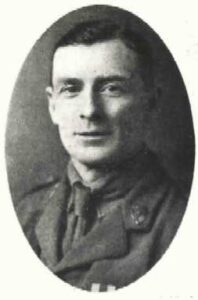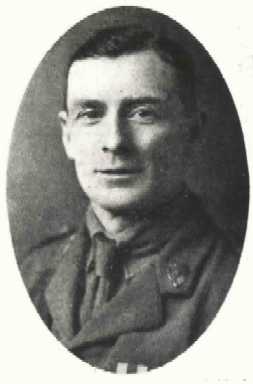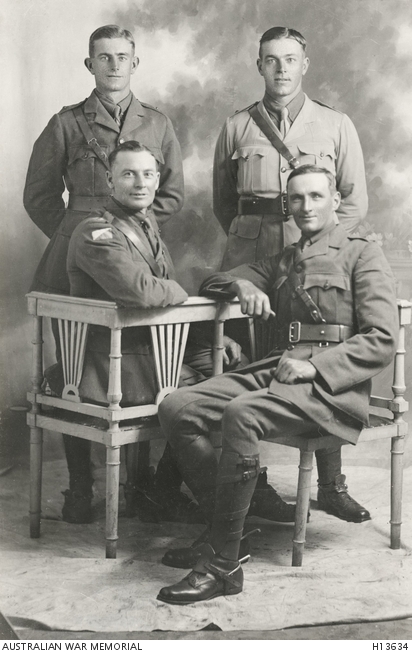For conspicuous gallantry and devotion to duty. He set a fine example to his men in every way during our advance, carrying a Hotchkiss rifle into action, as well as leading his troops. His conduct through the whole of the fighting was marked by the greatest coolness.
Many VFL players took up the community’s urging to ‘play the greater game’ during the Great War, and while less in number, but with equal patriotic fervour, VFL umpires, too, enlisted in the armed forces. One in particular brought credit to this fine band of sportsmen.
‘Bunny’ Nugent was a VFL umpire who served his empire and country in three conflicts, survived one of the most disastrous actions in Australian military history and was honoured for his gallantry during another. His heroism spawned a unique event in VFL football – on opening day 1918, Richmond and Essendon lined up prior to the match and applauded the umpire onto the ground! Nugent only umpired five VFL matches after his return. Like so many others, he became a victim of his service and his experiences in the hell of a war that was far from a game.
Henry James Nugent was born in Walkerville, South Australia, in 1880, and spent his first 18 years there before deciding to volunteer for the Boer War in South Africa.
With the official contingents fully subscribed, Nugent paid his own way to South Africa and joined first the Midland Mounted Rifles and then the Commander-in-Chief’s Bodyguard. He saw enough action to be awarded three clasps to his Queen’s South Africa Medal.
Like the majority of Boer War casualties, he succumbed to disease rather than wounds and returned to Australia in 1901, landing in Melbourne.
After recovering, Nugent went back to the game he loved – Australian football. A leg injury ended his playing days, and, as did many others in this period, he took up umpiring. While his rise through the ranks was not meteoric, after years umpiring in metropolitan and Tasmanian competitions, his application to join the Victorian Football League was accepted for the 1912 season.
He began the season in the VFL, umpiring the first round clash between Carlton and Geelong at Princes Park, and by season’s end, his match total stood at twelve. It was common at the time for field umpires to fill the roles of boundary umpires during off weeks, but, when not field umpiring in the VFL, Nugent officiated in the various country leagues to which the VFL supplied umpires.
He spent the entire 1913 and 1914 seasons in country Victoria and Tasmania. During these years, he was also a member of the VFL Umpires’ Association Executive. After joining the Executive in 1912, he served as junior vice-president in 1913 and returned to the Executive Committee the following year. In the days before social secretaries, he was responsible for the very successful 1914 Smoke Night – the VFLUA’s highlight of the social season.
Nugent had maintained his involvement with the military by serving in the Australian militia. Upon the outbreak of hostilities in Europe in 1914, he immediately enlisted in the Australian Imperial Force (AIF). He was taken on strength of the 8th Light Horse Regiment (LHR) as a trooper but was rapidly promoted to sergeant, based on his South African experience.
The Regiment went first to Egypt and was still in training with its horses when the call went out for volunteers to fight dismounted, as reinforcements for the First Australian Division who were facing stalemate at Gallipoli. Nugent and most of the regiment answered the call. By late May, they were on the Gallipoli Peninsula.
 After initially seeing little ‘action’, their first chance to attack came at the beginning of August. As part of a peninsula-wide offensive, the 8th and 10th LHRs were charged with attacking a narrow strip of ground known as ‘The Nek’. The trenches at this part of the line were between twenty and sixty metres apart and the plan called for four lines of 150 Light Horsemen to charge across no-man’s-land to capture the first lines of the Turkish trenches. They were to have artillery support prior to going ‘over the top’ and the troops were confident.
After initially seeing little ‘action’, their first chance to attack came at the beginning of August. As part of a peninsula-wide offensive, the 8th and 10th LHRs were charged with attacking a narrow strip of ground known as ‘The Nek’. The trenches at this part of the line were between twenty and sixty metres apart and the plan called for four lines of 150 Light Horsemen to charge across no-man’s-land to capture the first lines of the Turkish trenches. They were to have artillery support prior to going ‘over the top’ and the troops were confident.
As the time for attack approached, Nugent recalled:
“We had to sit in the trenches all night and heard the other attacks around us. All night we sat and the strain was awful. About 2 a.m. I went to sleep for about an hour. About 3 a.m. rum was served out.”
When the attack went in, it became one of Australia’s worst military disasters. The supporting naval gunfire stopped seven minutes early. This allowed the Turks to fully man their trenches. As each Australian line left the trench, the Turks created a firestorm of lead that effectively wiped out the Light Horsemen before they had gone ten metres. Both regiments ceased to exist.
Nugent was in the first line and managed to clear the parapet before being struck by a bullet that shattered his hand, spun him around and knocked him down. With the first line lying dead around him, he took cover behind a fallen trooper.
At some stage after this, Nugent managed to regain the trench. He later observed in a letter home:
“It was grand to see the spirit in which the boys went over the top of that trench at the word of command. Every man knew that he was going to almost certain death, but not one hesitated. We had only 40 yards to go to the Turkish trenches, but not one man reached them. Our men fell dead and wounded 10 yards from the goal. It was just hell, and no man could penetrate it and live.”
Evacuated to Egypt, Nugent did not recover in time to rejoin the regiment prior to the evacuation of the peninsula. A bad case of enteric fever kept him from seeing early action in the desert, but by mid-1916 he was amongst it. The 8th LHR saw combat in both Sinai and Palestine. Promoted to Regimental Sergeant-Major, then to Warrant Officer (First Class) and then Second Lieutenant, Nugent was a well-respected leader in the squadron.
He also had the opportunity of umpiring a series of matches played amongst the brigade’s three regiments, the Machine Gun Squadron and Brigade Headquarters. They used footballs supplied by the VFL and Nugent shared the umpiring duties with Corporal Deuchar, a Warrnambool umpire who would later be killed in action.
April 1917 saw the Allied armies planning to attack the Turkish stronghold of Gaza for the second time. The 3rd Light Horse Brigade was allocated the capture of the vital Atawinah Redoubt.
Resistance was very heavy and the 8th LHR, initially in reserve, was called into action. It was a day for leadership and, again, Henry Nugent answered the call.
He led B Squadron into the line 500 metres from the Redoubt and immediately they came under heavy machine gun and rifle fire. They were in the most open of the bare sectors, without even the protection of the barley crops afforded to units either side of them. Any soldier who was visible drew fire and the unit suffered heavily.
According to the Official History, “It was a day when true leaders recognised that their men needed inspiration” and Nugent was one who provided it. Moving from man to man, he encouraged them, directed their fire and showed by example bravery in the face of the enemy. He led an attack on a Turkish outpost, and when the squadron’s Hotchkiss rifle carrier was hit, Nugent picked up the weapon and used it to great effect against the nearby Turkish trenches.
In addition to the rifle and machine gun fire, the Turkish artillery was exceedingly accurate and deadly. By noon, it was clear the attack had failed. By three o’clock, the position was unchanged, with the exception of more casualties, and at five o’clock came the order to withdraw.
Nugent and the remaining officers organised the movement back to the starting point and the horses. The troopers retired in good order and set up positions to defend against a Turkish counter attack. The Regiment had lost six dead, with a further seven officers and 61 men wounded in the attack, which had been a complete failure along the whole front. Nugent had come through the second battle of Gaza unscathed.
As a result of his gallantry and leadership under fire, he was awarded the Military Cross, but it was to be the last action he would see in Palestine.
The strain of service saw his health deteriorate rapidly and culminated in an attack of eczema that covered his entire body. It was serious enough for him to be returned to Australia and discharged with the rank of Lieutenant.
Returning immediately to VFL football and umpiring, he came onto Punt Road for his comeback match and was surprised to see the Richmond and Essendon players lined up. He was more astonished when they gave him three cheers and a hearty round of applause. He had returned one of the VFL’s heroes.
Elected President of the VFLUA in 1919, Nugent’s remaining umpiring career was played out mainly in country Victoria. He added only five games to his pre-war total, giving him a total of 17 VFL senior matches.
As the 1920s progressed, Nugent’s health worsened with symptoms that were diagnosed as neurasthenia. Today, there is little doubt that they would be recognised as post-traumatic stress syndrome – a direct result of his service to his country.
By 1939, many of the symptoms had dissipated; but even so, it is remarkable that when Nugent applied for enlistment in the Australian Military Forces, he was accepted ‘Fit for Class II service’. He was so desperate to serve that he claimed his birthday was five years later than that which appeared on his First World War attestation. On October 16 1939, actually aged 59 years – and only 44 days after the outbreak of hostilities – he was taken on strength of the 3rd Garrison Battalion of the Reserve Forces stationed at Queenscliff.
He was soon promoted to staff sergeant and acting warrant officer, and over the next three-and-a-half years, he served at various garrison battalions, as well as the Ordnance and Headquarters battalions. Finally, on 1 February 1943, he was discharged from service having reached the retirement age – at least according to his claimed date of birth in 1939.
Henry James Nugent passed away aged 75, the result of a heart attack, in 1955.
His was a unique record. Certainly no other VFL umpire has equalled his combination of military service, awards of valour and service to his umpiring association and it is unlikely that any player of his era paralleled those achievements.
Nugent paid a heavy price for his service. He sacrificed much of his senior VFL umpiring career. He sacrificed much of his health through wounds and disease and stress, but he typified the umpires and the sportsmen who answered the call of their country. No one surpassed their efforts in ‘the greater game’.


